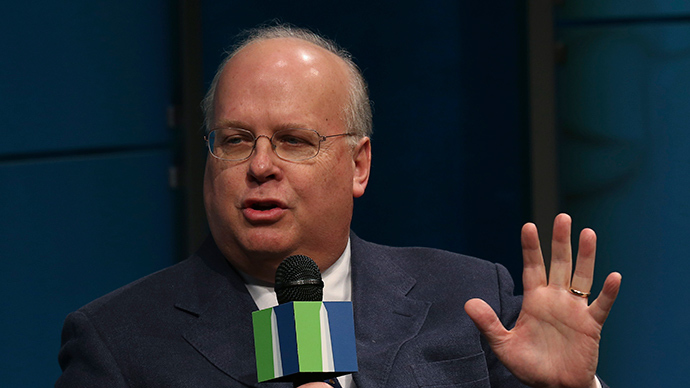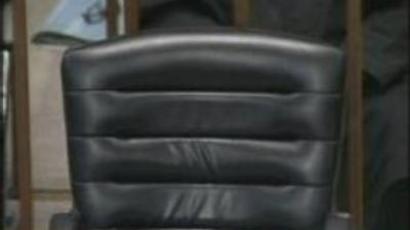Blame game: Karl Rove covered up discovery of chemical weapons in Iraq

Karl Rove, a powerful senior advisor to President George W. Bush, is to blame for covering up the discovery of nearly 5,000 chemical munitions in Iraq, Republican insiders told the Daily Beast.
“Let these sleeping dogs lie,” Rove told members of the administration and Republican lawmakers who began to find evidence of discarded chemical weapons in Iraq, the Daily Beast’s Eli Lake reported after interviewing people familiar with the issue.
The revelations about the found munitions during the Iraq War ‒ which were not the weapons of mass destruction the Bush team used as an argument for the invasion ‒ came to light Wednesday via a hefty, eight-part report by the New York Times, largely based on interviews with Iraqi and US officials and previously classified, highly redacted intelligence documents. Now those weapons may be in the hands of Islamic State militants.
The article noted that “17 American service members and seven Iraqi police officers…were exposed to nerve or mustard agents” between 2004 and 2011.
Former Sen. Rick Santorum (R-Pennsylvania) told Lake that US soldiers began sending him and his staff began photographs of discarded sarin and mustard-gas shells in 2004.
“One might think a politically vulnerable Bush White House would’ve seized on Santorum’s discovery,” Lake wrote. “After all, Bush and his subordinates famously accused Iraq of having active weapons of mass destruction programs.”
But Santorum said the administration wasn’t interested. “We don’t want to look back,” he recalled Rove saying. “I will say that the gist of the comments from the president’s senior people was ‘We don’t want to look back, we want to look forward’.”

Dave Wurmser, then a senior adviser to Vice President Dick Cheney on national-security issues, remembered hearing the same message in 2005 and 2006.
“Karl Rove and his team blocked public disclosure of these [findings] and said ‘Let these sleeping dogs lie; we have lost that fight so better not to remind anyone of it’,” he said.
Finding WMD in Iraq was supposed to be the smoking gun to validate starting a war to depose Iraqi President Saddam Hussein. But these found chemical munitions were not the evidence the Bush administration was referring to or looking for. And that, the report suggests, is one reason for the cover-up: The United States was largely responsible for Iraq having chemical weapons in the first place.
For much of the duration of the Iraq War, which saw US soldiers open a military invasion against the Ba’athist country in March 2003 amid tremendous international outcry, US forces "repeatedly encountered, and on six occasions were wounded by, chemical weapons” leftover from the Iraq-Iran War in the 1980s, the New York Times reported .
“In five of six incidents in which troops were wounded by chemical agents, the munitions appeared to have been designed in the United States, manufactured in Europe and filled in chemical agent production lines built in Iraq by Western companies,” the Times noted.
Since the found weapons weren’t the ones the US was looking for, the administration and the Pentagon saw no reason to disclose the discovery, former Rep. Pete Hoekstra (R-Michigan) told the Daily Beast. At the time, he was the party’s chair on the House Permanent Select Committee on Intelligence. In that role, he conducted his own investigation into the older weapons the military was finding. He said he felt stonewalled during the inquiry, not just by the White House, but by the Defense Department as well.
“They came out and said these were not the weapons we were looking for,” Hoekstra said Thursday. “Somewhere along the line we were talking to people who were lying to us. This has to reach fairly far and fairly high. I am absolutely furious about it.”
But Santorum argued ‒ then and now ‒ that not finding the WMD did not mean they didn’t exist.
“There was no active chemical-weapons operation in Iraq—that doesn’t mean there were no chemical weapons,” he told Lake. “That was the point we were making. It’s clear from The New York Times’ article that the military as well as the administration didn’t want to have that conversation because they missed it.”

The then-senator began raising the issue with the White House in 2005, but by 2006 he grew so frustrated with the hush-up that he wanted to go public, with or without President Bush’s blessing. Santorum, joined by Hoekstra, circulated a one-page summary of a military intelligence report about the munitions, CBS News reported at the time. "We now have found stockpiles," Santorum asserted.
But intelligence officials downplayed the discovery, noting that an assessment of the 500 munitions with mustard or sarin agents concluded they were so degraded that they couldn't be used as designed. "It is less toxic than most things that Americans have under their kitchen sink at this point," said David Kay, the first head of the team of weapons inspectors in post-invasion Iraq.
Regardless of their efficacy, Wurmser and others called for the stockpiles to be traced, retrieved and destroyed. He was dismayed to find “nobody was making any effort to track the source to the location of retrieval,” he told Lake. “Instead, we were continuing to try to buy up some of the stuff in the market.”
But the arguments fell on deaf ears. “It was all for nothing; Rove wanted the issue buried,” Wurmser said.













